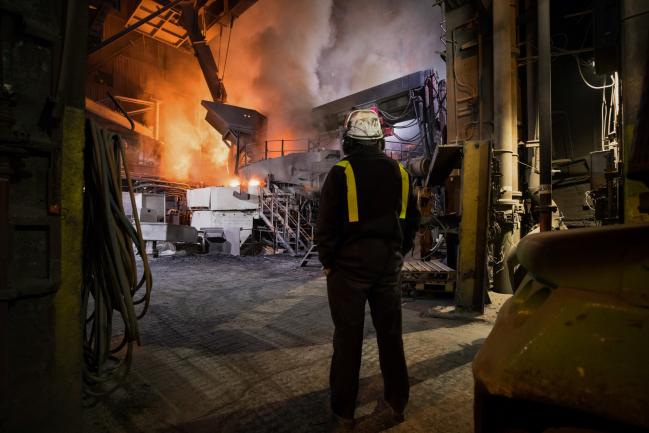(Bloomberg) -- China and the EU have joined a group of countries asking the World Trade Organization to investigate the Trump administration’s decision to impose metals tariffs on national security grounds. In a separate filing, the U.S. asked the WTO to review those nations that retaliated against its duties.
The move sets the stage for a showdown at the Geneva-based trade arbiter that some fear could either lead to a U.S. exit or a flood of new protectionist measures invoking what has until now been a rarely used national security loophole in global trade rules.
The U.S. has said the tariffs on imported steel and aluminum imposed earlier this year are allowed under the WTO’s national security exemption, which permits governments to take “any action which it considers necessary for the protection of its essential security interests.” This has drawn the ire of those affected, many of which are close American allies, such as the European Union and Canada.
Countries so far have refrained from challenging that at the WTO. But in a statement issued Thursday, Norwegian Foreign Affairs Minister Ine Eriksen Soreide said her country and other nations had chosen to request the establishment of a dispute panel at the WTO.
“We believe that the U.S.’s additional duty on steel and aluminum is in violation of the WTO rules,” she wrote.
A WTO spokesman declined to comment on the matter.
National Security
The dispute puts the trade organization in a difficult position: If it rules in support of the U.S. it could encourage other members to enact protectionist measures under the guise of national security. If it rules against the U.S. it could draw further ire from the largest economy in the world and a possible withdrawal by the Trump administration.
The “worst outcome” for the WTO is if the dispute settlement system “decided that it was in a position to judge whether something was or was not in the national security interests of the U.S. or any other member,” Deputy U.S. Trade Representative Dennis Shea said in an October speech in Washington.
So far, Canada, China, the EU, Mexico, Russia and Turkey have imposed retaliatory tariffs on more than $25 billion worth of U.S. goods. The Trump administration previously said there was no basis under WTO rules for the countries to impose their retaliatory tariffs.
“These tariffs appear to breach each WTO Member’s commitments under the WTO agreement,” U.S. Trade Representative Robert Lighthizer said in July. “The U.S. will take all necessary actions to protect our interests.”
Metals Tariffs
The requests will be considered at the next meeting of the WTO dispute settlement body, which is scheduled for Oct. 29.
Nine WTO members -- Canada, China, the EU, India, Mexico, Norway, Russia, Switzerland and Turkey -- have filed initial complaints that allege Trump’s tariffs on steel and aluminum violated WTO rules. But Thursday’s move takes the disputes an important step closer to a formal case.
The complaints differ slightly, but each country alleges that the measures violate core WTO agreements such as the General Agreement on Tariffs and Trade, or GATT, and the WTO Safeguards Agreement, which governs the use of temporary trade restrictions, known as safeguards.
In July, the U.S. said its tariffs were authorized under Section 232 of the U.S. Trade Expansion Act of 1962 -- which permits the president to impose trade restrictions if imports are found to harm U.S. national security.
The U.S. argued that WTO members have a legal right to impose national security tariffs under Section 21 of the GATT, which permits a government to take “any action which it considers necessary for the protection of its essential security interests.”
‘America First’
If the WTO determines that national security measures aren’t permitted under the WTO’s national security exemption it could then ask Trump to roll back a key tool in his “America First” trade arsenal.
Conversely, if the WTO agrees with the U.S. argument it could encourage Trump to implement national security tariffs on cars and spur a proliferation of other new trade restrictions authorized under the guise of national security.
The U.S. Commerce Department is conducting an investigation to determine if foreign imports of autos and auto parts are having a detrimental impact on U.S. national security. The inquiry is identical to the process the Trump administration pursued earlier this year when it triggered 25 percent tariffs on steel and 10 percent tariffs on aluminum in the name of protecting U.S. national security.
The move also comes as the Trump administration has mounted a broader attack on the WTO’s dispute system, which it accuses of overreach.
Since last year the U.S. has blocked the appointment of new members of the WTO’s appellate body, bringing the number of appellate judges in Geneva from the usual seven down to three.
If nothing changes, that number is due to fall further by the end of next year, leaving the body unable to form the requisite three-member appeals panel to hear a dispute.
(Updates with U.S. request to WTO starting in first paragraph.)
